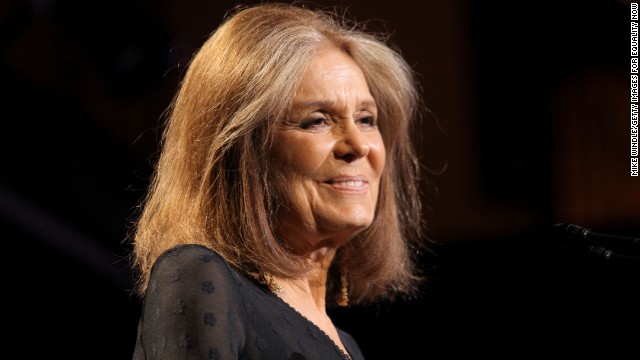 Writer and activist Gloria Steinem speaks in November during an Equality Now event in Los Angeles. Steinem helped usher in the women's liberation movement during the 1960s and 1970s, and she remains one of its most outspoken and visible symbols.
Writer and activist Gloria Steinem speaks in November during an Equality Now event in Los Angeles. Steinem helped usher in the women's liberation movement during the 1960s and 1970s, and she remains one of its most outspoken and visible symbols.  A portrait of Steinem circa 1970. In 1971, she co-founded Ms. magazine, the first magazine to be created and operated entirely by women.
A portrait of Steinem circa 1970. In 1971, she co-founded Ms. magazine, the first magazine to be created and operated entirely by women. 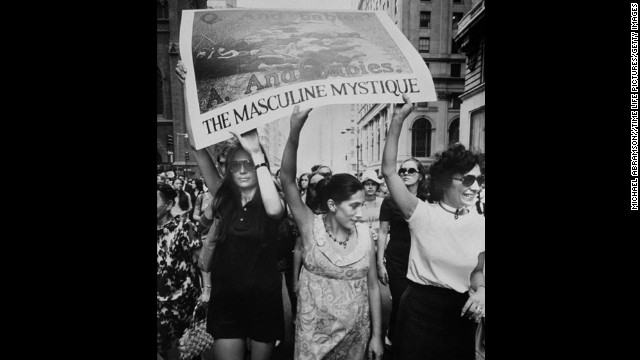 Steinem, left, helps hold up an image of the My Lai Massacre during a 1970 march down New York's Fifth Avenue.
Steinem, left, helps hold up an image of the My Lai Massacre during a 1970 march down New York's Fifth Avenue.  Steinem is featured as "The New Woman" on the cover of Newsweek in 1971. She was increasingly seen as the spokeswoman of the women's movement, although the headline to the story inside -- " A Liberated Woman Despite Beauty, Chic and Success" -- showed there was still a long way to go.
Steinem is featured as "The New Woman" on the cover of Newsweek in 1971. She was increasingly seen as the spokeswoman of the women's movement, although the headline to the story inside -- " A Liberated Woman Despite Beauty, Chic and Success" -- showed there was still a long way to go.  Steinem speaks at the 1972 Democratic National Convention in Miami, where she nominated Frances "Sissy" Farenthold for vice president. Steinem co-founded the National Women's Political Caucus, which works to increase the number of women in the political field.
Steinem speaks at the 1972 Democratic National Convention in Miami, where she nominated Frances "Sissy" Farenthold for vice president. Steinem co-founded the National Women's Political Caucus, which works to increase the number of women in the political field.  Steinem, left, and Jill Ruckelshaus listen to a question during their appearance on NBC's "Meet the Press" in Washington in 1972.
Steinem, left, and Jill Ruckelshaus listen to a question during their appearance on NBC's "Meet the Press" in Washington in 1972.  Steinem presents presidential nominee Jimmy Carter with a copy of Ms. magazine in 1976. The magazine featured Carter's mother on the cover.
Steinem presents presidential nominee Jimmy Carter with a copy of Ms. magazine in 1976. The magazine featured Carter's mother on the cover.  Steinem looks over a copy of Ms. magazine at her desk in 1980.
Steinem looks over a copy of Ms. magazine at her desk in 1980.  From left, fashion designer Diane von Furstenberg, Steinem, activist Bella Abzug and Barbra Streisand attend a 1981 benefit in Streisand's honor for Women USA.
From left, fashion designer Diane von Furstenberg, Steinem, activist Bella Abzug and Barbra Streisand attend a 1981 benefit in Streisand's honor for Women USA.  Steinem walks with writer Maya Angelou on their way to the March on Washington on August 27, 1983. The event commemorated the 20th anniversary of Martin Luther King Jr.'s "I Have a Dream" speech.
Steinem walks with writer Maya Angelou on their way to the March on Washington on August 27, 1983. The event commemorated the 20th anniversary of Martin Luther King Jr.'s "I Have a Dream" speech.  Steinem, right, poses with actress Kirstie Alley at the Ms. magazine offices in 1984. Alley played Steinem in "A Bunny's Tale," a 1985 TV movie based on Steinem's experience going undercover to work as a Playboy bunny in 1963. After her undercover work, Steinem wrote an expose about the poor pay and working conditions.
Steinem, right, poses with actress Kirstie Alley at the Ms. magazine offices in 1984. Alley played Steinem in "A Bunny's Tale," a 1985 TV movie based on Steinem's experience going undercover to work as a Playboy bunny in 1963. After her undercover work, Steinem wrote an expose about the poor pay and working conditions. 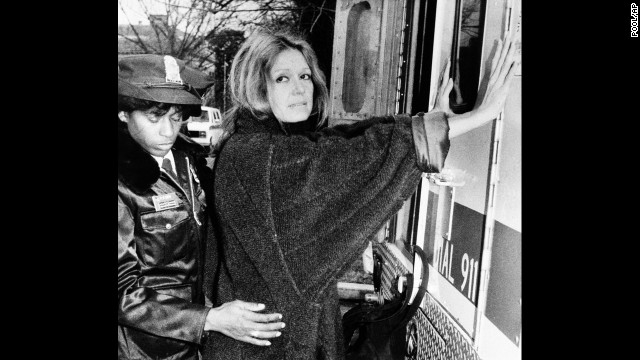 A police officer arrests Steinem in 1984 during an anti-apartheid protest outside the South African Embassy in Washington.
A police officer arrests Steinem in 1984 during an anti-apartheid protest outside the South African Embassy in Washington.  Steinem applauds first lady Hillary Clinton at Clinton's address to the New York Women's Agenda in 1995.
Steinem applauds first lady Hillary Clinton at Clinton's address to the New York Women's Agenda in 1995.  Steinem poses with Gloria Feldt, former president of Planned Parenthood, at a reception in 1999. The event celebrated the relaunch of Ms. magazine by Liberty Media for Women.
Steinem poses with Gloria Feldt, former president of Planned Parenthood, at a reception in 1999. The event celebrated the relaunch of Ms. magazine by Liberty Media for Women.  Steinem holds up a copy of her book "Enslaved" as she speaks during a 2007 protest on the steps of the state Supreme Court in Albany, New York.
Steinem holds up a copy of her book "Enslaved" as she speaks during a 2007 protest on the steps of the state Supreme Court in Albany, New York.  Librarian of Congress James Billington awards Steinem a Living Legend medal during the Library of Congress' 200th birthday party in 2011.
Librarian of Congress James Billington awards Steinem a Living Legend medal during the Library of Congress' 200th birthday party in 2011. 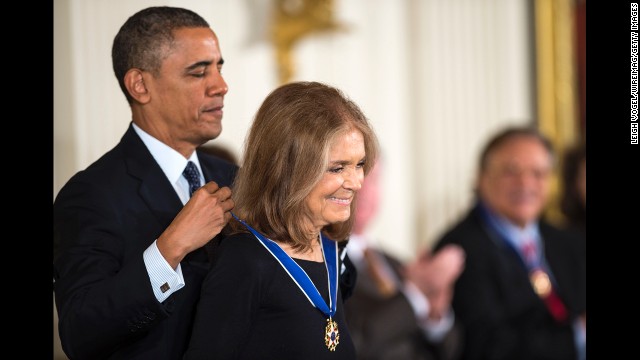 Steinem is presented the Presidential Medal of Freedom by President Barack Obama at the White House in November. It is the nation's highest civilian honor.
Steinem is presented the Presidential Medal of Freedom by President Barack Obama at the White House in November. It is the nation's highest civilian honor.
- The face of feminism, Gloria Steinem, turns 80 on Tuesday
- Carol Costello says feminism is popular with young women, who reject stereotypes
- Rush Limbaugh railed against Sandra Fluke, but his jibes cut little weight with many, she says
- Young women see the value in speaking out against gender bias, she says
Editor's note: Carol Costello anchors the 9 to 11 a.m. ET edition of CNN's "Newsroom" each weekday.
(CNN) -- Happy birthday, Gloria Steinem!
The "Face of Feminism" turns 80 Tuesday, and guess what? Feminism seems to be turning the corner -- again. Many young women are now embracing the term and rejecting the notion that feminists are hairy, ugly, man-hating, angry women.
Heck, even Beyonce appeared on the cover of Steinem's magazine, Ms., last year.
And lest critics point to Beyonce's overt sexuality as evidence of her hypocrisy, this year Queen Bey took it a step further and wrote an essay for "The Shriver Report: A Woman's Nation Pushes Back from the Brink." In it, Beyonce Knowles-Carter (note the hyphenated name!) proclaimed that "gender equality is a myth!" She went on to write, "the average working woman earns only 77 percent of what the average working man makes. But unless women and men both say this is unacceptable, things will not change."
A few years ago, Emma Watson told People magazine of her "Harry Potter" character, "Hermione's not scared to be clever. I think sometimes really smart girls dumb themselves down a bit, and that's bad." Watson added she's a lot like Hermione: "I'm a bit of a feminist. I'm very competitive and challenging."
That's not to say all young women feel the same. Or certain older men.
5 reasons why we love Gloria Steinem
 Gloria Steinem: Medal of Freedom honoree
Gloria Steinem: Medal of Freedom honoree 
 The names Betty, Gloria and Shirley probably come to mind when most think of feminists, but there's a whole group of young women -- and men -- who are working toward equality. Here is a short list -- who would you add? Tweet us @CNNLiving with #fem2. Malala Yousafzai is a Pakistani student and education activist, who gained international attention after she was shot in 2012 by Taliban gunmen. "I want to become a prime minister of Pakistan," she said, saying it could make her "the doctor of the whole country."
The names Betty, Gloria and Shirley probably come to mind when most think of feminists, but there's a whole group of young women -- and men -- who are working toward equality. Here is a short list -- who would you add? Tweet us @CNNLiving with #fem2. Malala Yousafzai is a Pakistani student and education activist, who gained international attention after she was shot in 2012 by Taliban gunmen. "I want to become a prime minister of Pakistan," she said, saying it could make her "the doctor of the whole country."  Journalist Gloria Steinem poses with Kierra Johnson at the Ms. Foundation's Women of Vision 2013 Gala earlier this year. Johnson, the executive director of Choice USA, an abortion rights organization, has worked to mobilize youth around reproductive justice.
Journalist Gloria Steinem poses with Kierra Johnson at the Ms. Foundation's Women of Vision 2013 Gala earlier this year. Johnson, the executive director of Choice USA, an abortion rights organization, has worked to mobilize youth around reproductive justice.  There's been no shortage of ink written on Tavi Gevinson, the wunderkind founder and editor-in-chief of the online magazine, Rookie. In her 2012 TEDtalk on feminism, she spoke about women in media: "What makes a strong female character is a character who has weaknesses, who has flaws, who is maybe not immediately likable, but eventually relatable."
There's been no shortage of ink written on Tavi Gevinson, the wunderkind founder and editor-in-chief of the online magazine, Rookie. In her 2012 TEDtalk on feminism, she spoke about women in media: "What makes a strong female character is a character who has weaknesses, who has flaws, who is maybe not immediately likable, but eventually relatable."  Samhita Mukhopadhyay is is a feminist writer, speaker and digital strategist. As the former executive editor of Feministing.com, she also wrote "Outdated: Why Dating is Ruining Your Love Life." Now, she works as a senior strategist at Purpose developing digital campaigns for girls and women.
Samhita Mukhopadhyay is is a feminist writer, speaker and digital strategist. As the former executive editor of Feministing.com, she also wrote "Outdated: Why Dating is Ruining Your Love Life." Now, she works as a senior strategist at Purpose developing digital campaigns for girls and women. 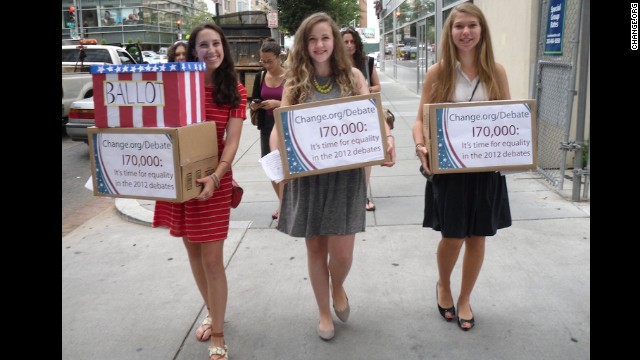 Sammi Siegel, Emma Axelrod and Elena Tsemberis are three New Jersey teens who petitioned to get a female moderator for the 2012 presidential debate. CNN's Candy Crowley was named a moderator for the second debate, in which wage parity became an issue.
Sammi Siegel, Emma Axelrod and Elena Tsemberis are three New Jersey teens who petitioned to get a female moderator for the 2012 presidential debate. CNN's Candy Crowley was named a moderator for the second debate, in which wage parity became an issue.  Gaby Pacheco, an immigrant rights leader and director of the Bridge Project, left, was accompanied by Janet Murguía, president and CEO of the National Council of La Raza, when Pacheco testified before Congress about the DREAM Act.
Gaby Pacheco, an immigrant rights leader and director of the Bridge Project, left, was accompanied by Janet Murguía, president and CEO of the National Council of La Raza, when Pacheco testified before Congress about the DREAM Act.  Jamia Wilson is the executive tirector of YTH -- Youth Tech Health -- an organization that advances youth health and wellness through technology. She's been named one of faces of the future of feminism and was part of a co-founding leadership committee member of SPARK Movement.
Jamia Wilson is the executive tirector of YTH -- Youth Tech Health -- an organization that advances youth health and wellness through technology. She's been named one of faces of the future of feminism and was part of a co-founding leadership committee member of SPARK Movement.  Shelby Knox was featured in a documentary that chronicled her teenage activism for comprehensive sex education and gay rights in her Southern Baptist community. She has been an activist for 10 years, and works at Change.org on campaigns for gender justice.
Shelby Knox was featured in a documentary that chronicled her teenage activism for comprehensive sex education and gay rights in her Southern Baptist community. She has been an activist for 10 years, and works at Change.org on campaigns for gender justice.  Sunny Clifford is advocate for reproductive health and justice and petitioned for Native American women's access to emergency contraception. She was featured in the documentary "Young Lakota."
Sunny Clifford is advocate for reproductive health and justice and petitioned for Native American women's access to emergency contraception. She was featured in the documentary "Young Lakota."  Jill Adams is the executive director for the Center on Reproductive Rights and Justice, and formerly led the Law Students for Reproductive Justice.
Jill Adams is the executive director for the Center on Reproductive Rights and Justice, and formerly led the Law Students for Reproductive Justice.  Photos: Feminists of the future
Photos: Feminists of the future Rush Limbaugh perverts the word "feminist" all the time. He likes to call his targets "feminist extremists" and "feminazis."
In 2012, Limbaugh took on Georgetown law student Sandra Fluke. She testified before Congress about the need for her Jesuit university to provide contraception insurance coverage for female students.
She even admitted to being an "American woman who uses contraceptives." Oh, my!
Limbaugh promptly labeled her a "feminazi" and a "slut."
Or to quote the big man himself, "So, Ms. Fluke and the rest of you feminazis, here's the deal. If we are going to pay for your contraceptives, and thus pay for you to have sex, we want something for it, and I'll tell you what it is. We want you to post the videos online so we can all watch."
It so evokes Bobby Riggs, right? A pro tennis player who, on September 20, 1973, challenged Billie Jean King to a tennis match because "the best way to handle women is to keep them barefoot and pregnant."
Happy 80th, Gloria Steinem
Courtney Martin, who co-edited Feministing.com -- a widely read and influential feminist blog -- and author of "Perfect Girls, Starving Daughters," says many young women have been afraid of the word "feminist" because it's been the target of a powerful smear campaign for decades. But, thanks largely to the Internet, smears like Limbaugh's are losing their power.
At Feministing.com, she says, "we get mail from teenaged girls in the middle of Iowa who say ... 'I stumbled on your site and realized feminism isn't about man-hating and Birkenstocks.' " It's actually "kind of cool and counter-cultural."
Wow. Really? Martin says yes. Because today's feminist movement realized it had to embrace aesthetics. Beauty and fun and relationships matter, too. So does the cool factor. Jon Stewart, anyone? Stewart has a cultural agenda, he's cool, and young people follow him in droves.
Jessica Valenti, an author sometimes described as a feminist evangelist, says that when she delivered talks on feminism on college campuses a few years ago, one or two hands went up when she asked who considered themselves a feminist. Today, she says, "now almost all of them do."
And, says Martin, it's not just because of "cool" or contraception or abortion rights. It's because of a more evolved definition of feminism.
"Feminism means a fight for others," Martin said. It's about living a "feminist life." That means equality for everyone: women, children and, yes, men. That includes advocating on issues like immigration, human trafficking and so much more.
Perhaps Lena Chen, an activist and media commentator for Salon, Glamour and her own blog, put it best. "In my lifetime feminism has evolved far beyond the binary identity politics of women vs. men," she wrote in an e-mail. "To me, feminism is one part of a larger global movement for liberation. Gender norms dictating how you ought to behave, dress, marry, or work are oppressive regardless of what body you inhabit or how you identify yourself."
She says social media have helped many young activists in her generation speak with powerful voices.
They no longer need one "figurehead" in "order to create change."
They just need each other.
So, happy birthday, Gloria. On your 80th birthday, feminism has indeed turned a corner. We'll have to see how far it has gone when you turn 90. Or 100.
Follow us on Twitter @CNNOpinion.
Join us on Facebook/CNNOpinion.
The opinions expressed in this commentary are solely those of Carol Costello.